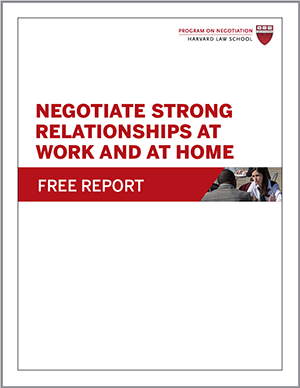
In the aftermath of a large-scale catastrophe or disaster in the United States—such as 9/11, the opioid epidemic, and mass shootings—the courts can be ill-equipped to take on the complex task of negotiating a compensation offer for large numbers of claimants. Instead, “special masters” are often assigned to create and administer victim-compensation programs, a job that typically requires thousands of negotiations on emotionally wrenching issues.
Program on Negotiation chair Guhan Subramanian spoke with with special masters who have overseen many mass-disaster programs: Kenneth Feinberg (9/11 Victim Compensation Fund, Catholic Church sexual-abuse crisis); Resolutions, LLC cofounder Eric Green (Enron securities, Takata airbags); and Duke University professor Francis McGovern (BP Deepwater Horizon oil spill, opioid epidemic). Their remarks offer insights to those facing complex multiparty conflicts.
Reaching an acceptable compensation offer is complicated, but there is almost always a common denominator.
Guhan Subramanian: In your work, is it useful to use a scoring system to quantify harm?
Francis McGovern: You can use numbers as surrogates for intangibles, such as psychological harm. It can be really difficult to put a number on psychological harm, so [for the 2003 Rhode Island nightclub fire] we used medical expenses: If you went to your psychiatrist and you had medical expenses, then that would be counted in the metric. It ends up, at the end of the day, being acceptable, because the people [harmed] will accept it. . . . If everybody agrees to a particular approach, I don’t really care what the approach is, as long as you have that buy-in.
Eric Green: At some point, all these cases come down to who gets compensation for grievous injuries, and no amount of money is really sufficient to compensate, but it’s all we have. And most of the time we have a limited fund. . . . So one must come up with a model to allocate within that limited fund among the range of injuries. And if it’s an alternative system and not being litigated, it has to be a model that has logic to it, that is transparent, where the people affected have a say in it. It has to be done with integrity, fairness, and openness. All of those things demand a lot of innovation at every stage of the way.
GS: I was struck when you said that the victims should have some say in the process.
FM: We’re special masters. How are we legitimate? . . . We don’t have the imprimatur of a jury verdict. And so the way we achieve legitimacy . . . is getting people to participate in the decision- making process.
GS: In addition to the quantitative models you use, do you make qualitative judgment calls?
EG: Almost every model that I can think of that I’ve been involved in has provisions for extraordinary cases, so there is an element of discretion. And, of course, we know from the outset that we’re never going to make everybody happy. There are going to be people who are not going to accept any compensation offer, who feel they weren’t treated the way they should have been, and are going to let you know it.
GS: We talk in negotiations about expressing empathy. Ken [Feinberg], I think, if the public reports are accurate, you and your team agreed to hear from 9/11 victims. Anyone who wanted to speak to you or your team could do so. Obviously, that’s incredibly powerful, but is it a useful approach in general?
Kenneth Feinberg: It’s the key! All of these models that I’ve been involved in substantively can vary, but there’s one common denominator, and that is the emotionalism of victims or their surviving family members. And empathy and providing those who voluntarily want it an opportunity to be heard in private are essential.
I’m now dealing with . . . Catholic Church clergy sexual-abuse cases in five states, and the one common denominator is the victim who was abused as a minor, and is now 30, 40, 50 years old, and comes in private to see me—not to complain about the compensation offer. They want validation. They want acknowledgment of what was done. They want somebody independent to say to them, “I believe you. You were wronged. It’s awful.” The number of people who were afforded that opportunity to be heard and leave feeling better, knowing that somebody said, “Yes, you were accurate, truthful, credible,” is critical to the success all of these programs—from Agent Orange or 9/11 right up to the present time.
Have you had to negotiate a compensation offer for victims of a large-scale disaster? How did you find an acceptable agreement?





